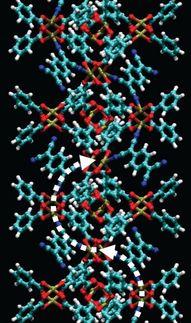High performance semiconductor spray paint could be a game changer for organic electronics
Wake Forest University's Organic Electronics group has developed an organic semiconductor 'spray paint' that can be applied to large surface areas without losing electric conductivity
Researchers at Wake Forest University's Organic electronics group have come up with a novel solution to one of the biggest technological barriers facing the organic semiconductor industry today. Oana Jurchescu, an assistant professor of physics, and a team of researchers developed a high performance organic semiconductor 'spray paint' that can be applied to large surface areas without losing electric conductivity. This is a potentially game changing technology for a number of reasons.
Organic thin film transistors are currently deposited by one of three methods. Drop casting and spin coating conduct electricity well but are limited to small area applications. They could not be used to make a wall-sized, flexible video screen for instance. On the other hand, organic spray-on techniques can be applied to large areas but have poor performance when compared to their small-area counterparts.
Jurchescu's work provides the best of both worlds. The spray-deposition technology developed in her lab produced the highest performance organic thin film transistors for this method comparable to those of drop casting and spin coating. Unlike drop casting and spin coating, her spray-deposition technology can be applied over large surfaces to any medium-from plastic and metal to human skin.
Her team's research, High Mobility Field-Effect Transistors with Versatile Processing from a Small-Molecule Organic Semiconductor was published in the journal Advanced Materials.
Because of its superb performance and the fact it can be applied over large areas quickly (it is also inexpensive to process compared to inorganic semiconducting materials like silicon), it has the potential to be produced in commercial quantities. The technology is a big step towards realizing futuristic devices such as transparent solar cells on building windows, car roof and bus stations, electronic displays in previously inaccessible spaces and wearable electronics due to the organic plastics' thin, lightweight and conformal nature.
Most read news
Other news from the department science

Get the chemical industry in your inbox
By submitting this form you agree that LUMITOS AG will send you the newsletter(s) selected above by email. Your data will not be passed on to third parties. Your data will be stored and processed in accordance with our data protection regulations. LUMITOS may contact you by email for the purpose of advertising or market and opinion surveys. You can revoke your consent at any time without giving reasons to LUMITOS AG, Ernst-Augustin-Str. 2, 12489 Berlin, Germany or by e-mail at revoke@lumitos.com with effect for the future. In addition, each email contains a link to unsubscribe from the corresponding newsletter.



























































